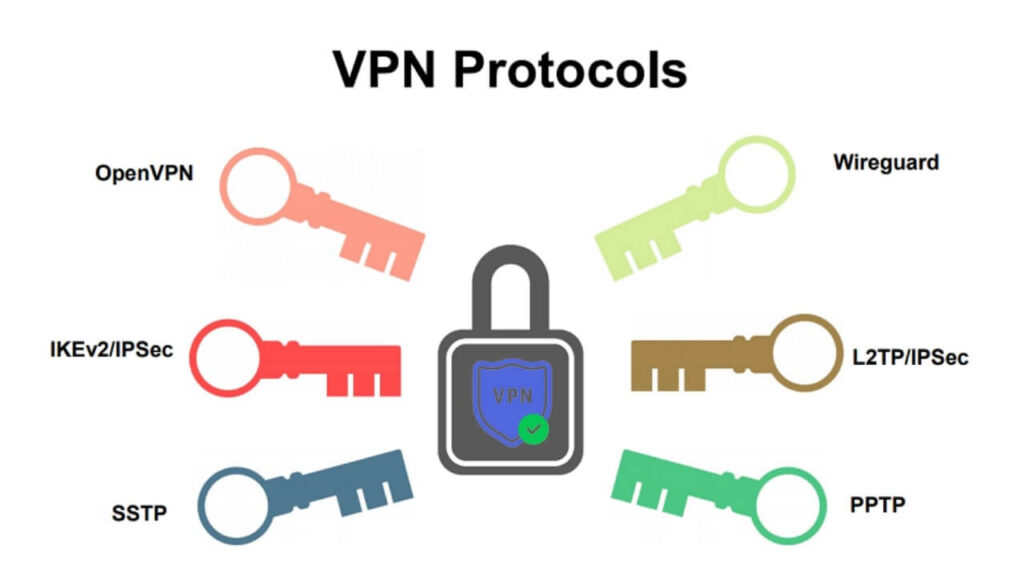When you want to send something overseas to your destination as one piece without breaking it. You will need safe packing (Bubble wrapping). Likewise, VPN protocols will send your data over a VPN network. Not all VPNs are equal they differ by the protocol they use changing security, speeds, privacy, etc. This guide is for you clearly explaining VPN protocols.

When a VPN (Virtual Private Network) creates a tunnel connection between your device & the internet to protect your online privacy & prevent other’s spying on your activities. Before transmission, your data will be encrypted with a set of protocols. Today we will discuss these protocols with their pros & cons.
What is VPN protocol?
First of all, VPNs and their protocols aren’t 😅the same. A VPN protocol defines the set of rules on how the tunnel is formed and data will be packed before transmission. This will ensure secure transmission.
When you are connecting to the servers overseas remotely like you are connected with a wire. VPN protocols (tunneling protocols) will ensure two things.
- Create a secure tunnel- Keeps your connection private (seperate from public internet) so that your data couldn’t be spyed.
- Bypass restrictions- When you stream or access websites (restricted) using TCP or UDP protocols bypassing cencorship.
Each VPN protocol will address different means to solve the privacy & security issues to keep you anonymous when you are using the internet. Every VPN protocol is not perfect, some of them have vulnerabilities (reported) and some of them are secure.
Types of VPNs
There are two types of VPNs:
- Remote Access VPNs When you are using VPNs (personal use) they will be remote access VPNs that encrypet your data (sent or recieved) on your device so that nobody can spy on you or snoop your data.
- Site-To-Site VPNs These are used to expand compans network in different locations. Also they are again classified into two categories: Intranet based & extranet based.
All the VPNs are driven by VPN protocols, below described ones below are the most common VPN protocols available all time.
📝Note: You can’t force to run protocols on the unsupported network (like forcing owners of the website to go with HTTPS when it is HTTP).
VPN Protocols Working
You might have aware of common communication protocols like TCP/IP, HTTP, SMTP, etc. While the protocols need some parameters like 📦Packet Size, error correction, authentication techniques, and address formatting. Despite all the protocols have the same functionality, they are different protocols available.
The primary function of the protocols is to exchange the data between two networks after authenticating (genuine or not) on both ends. Then after encrypting the data to make (protection) it is protected from third parties.
Though all protocols sever the same, the different rule set makes them what they care most. E.g. some VPN protocols prioritize speeds, others on security & privacy.
Most Common VPN protocols
1. OpenVPN
OpenVPN is a very popular & secure open-source VPN protocol used by many VPN service providers from its initial release in 2001. This can run on both TCP or UDP (the former one is more reliable and the latter one is the fastest one). Most of the VPN service providers use this as default protocol, it is not super fast or super slow either.
Most VPNs like NordVPN, ExpressVPN, Surfshark use these protcol.
Pros
✅ Open Source, this will benefit in being transparent and available for everyone to try out & check the code for any vulnerabilities or threats to your security.
✅ Versatile can be used with different encryption techniques, configurations to be secure and lightweight.
✅ Security, this can run on almost any encryption.
✅ Firewall Bypass, with OpenVPN you can bypass all the firewalls simply.
Cons
❌ Heavy Setup, due to OpenVPN protocol versatile nature configurations might end up being complex (when a user tries to set up their own OpenVPN)
2. IPSec/ IKEv2
IKEv2 is developed by Microsoft & Cisco to be the foundation of security and compatible with mobile devices running on 3G, 4G LTE, this protocol shines at stability (quicky reconnect even when the connection drops). IKEv2 uses IPSec tools for better VPN coverage. This protocol is really fast & secure with a quick setup.
Most VPNs like NordVPN, ExpressVPN supports this protocol.
Pros
✅ Stability, this protocol uses Mobility & Multi homing protocol from the IPSec toolkit to ensure the connection between the user & server remains stable (even during traveling). So most VPN providers trust this protocol for its stability on mobile devices.
✅ Security, IKEv2 packed with most leading encryption techniques on IPSec tool making this the most secure VPN protocol.
✅ Speed, though it consumes some bandwidth (on Active). But the NAT traversal makes this to communicate faster to bypass firewalls.
Cons
❌ Limited Support, we couldn’t expect this protocol to be supported by a wide range of operating systems. Though this won’t look like a real issue for windows users but for other operating systems it does.
3. WireGuard
Wireguard is the latest & recently added VPN protocol, quickly opted for by all VPN service providers due to its capabilities (fast, secure). WireGuard makes this possible by eliminating extra hurdles on other VPN protocols like OpenVPN, IKEv2. Since Linux kernel (base for most operating systems) runs this protocol, it is compatible with all the device platforms.
Most VPNs like NordVPN, ExpressVPN supports this protocol. But NordVPN couples Wireguard with NordLynx for better performance.
Pros
✅ Open Source & Free, this protocol uses Mobility & Multi homing protocol from IPSec toolkit to ensure the connection between the user & server remains stable (even during traveling). So most VPN providers trust this protocol for its stability on mobile devices.
✅ Lastest & Fastest, IKEv2 is packed with most leading encryption techniques on the IPSec tool making this the most secure VPN protocol.
Cons
❌ Not well developed, we couldn’t expect this protocol to be supported by a wide range of operating systems. Though this won’t look like a real issue for windows users but for other operating systems it does.
4. SSTP
Secure Socket Tunneling Protocol (SSTP) is a fairly secure protocol created by Microsoft. This will also work on Linux as well but is primarily designed for windows. While every VPN protocol has ups & downs it’s up to you which one to choose. Still some VPNs like Surfshark, PrivateVPN, NordVPN along ExpressVPN support this protocol.
Pros
✅ Developed by Microsoft, you can expect support from Microsoft windows for these protocols. When you try to set things up by yourself easily.
✅ Secure, like most other secure protocols this one also supports AES 256 bit encryption.
✅ Bypass Firewalls, SSTP can break through any firewall through its away without interrupting your connection.
Cons
❌ Microsoft Ownership, As this protocol is owned by Microsoft the code isn’t available for everyone to be checked or for testing. When Microsoft working with NSA or other enforcement agencies there will be some backdoors.
5. L2TP/ IPSec
L2TP (Layer 2 Tunneling Protocol) doesn’t offer any encryption apart from creating a connection between you and VPN server. Instead, this one relies on other IPSec suite tools to encrypt your internet traffic and comes with few convenient features but, there are many issues with this one. NordVPN no longer supports this protocol as they saw many drawbacks in this. But you can still find this one protocol on some other VPN service providers.
Pros
✅ Security, since there is no encryption L2TP is weak in terms of security. But it can support encryption through other suite tools make this lightweight on the go.
✅ Availability, you can observe this protocol on almost all modern systems. This has been adopted just to include in the list without
Cons
❌ Compromised by NSA, you can use this protocol standalone without the IPSec toolkit. So this protocol will face the same vulnerabilities as IKEv2.
❌ Very Slow, all your traffic data will be encapsulated twice leads to poor surfing speeds.
❌ Firewall Restrictions, L2TP couldn’t bypass firewalls well like other VPN protocols. Some strong system surveillance can block this protocol (people who use the L2TP protocol are the prey for these systems).
6. PPTP
Point to Point Tunneling Protocol (PPTP) is in the market since 1999. This protocol is initially created to dial-up tunnel traffic and uses some of the weakest encryption protocols leaving the security aside. There are more vulnerabilities upon using this protocol.
Pros
✅ Fast, as this protocol is not concerned about security and was created long ago modern systems can run this one very quickly & fast. It’s quite popular for people who want to set up a home VPN strictly (to access geo-blocked content).
✅ Compatible, ever since this protocol has been made. PPTP is the minimum standard for tunneling and encryption supporting every modern system, this makes it simple to set up & use.
Cons
❌ Insecure, there are several vulnerabilities found in this protocol. While some of them are patched, Microsoft is encouraging users to shift to other latest protocols.
❌ Cracked by NSA, NSA claims to crack this protocol frequently as a piece of cake.
❌ Firewall Restrictions, being old these are easy to block via firewall. If you use this protocol at your school or business areas this isn’t the one for you.
When to use a specific protocol
You can use every protocol at once😅. So we are helping out when you have to use which protocol.
OpenVPN: Use this one for superior security like when you are connecting to public Wi-Fi or when you think security is your top priority over anything.
IPSec/IKEv2: This protocol guarantees your VPN connection stability when you are switching connections from cellular to Wi-Fi or vice versa. This will be a good choice when you want to quickly bypass the firewalls with high speeds.
Wireguard: When speeds are your top priority use this protocol for streaming, gaming, or downloading.
SSTP: Though this is an old one in the protocol list, useful for bypassing geo-block restrictions providing some privacy while you are browsing.
L2TP/IPSec: When you want to securely shop anything on the internet use this one. Also beneficial when you want to float across several company branches into one network.
PPTP: Ignore this one for most usages apart from streaming or accessing geo-blocked content.
Quick Comparision
| VPN Protocol | Speed | Encryption | Streaming | Stability | P2P(Torrenting) |
| OpenVPN | Fast | Very Good | Good | Good | Good |
| IPSec/IKEv2 | Fast | Good | Good | Very Good | Good |
| Wireguard | Very Fast | Very Good | Good | Very Good | Good |
| SSTP | Medium | Good | Medium | Medium | Good |
| L2TP/IPSec | Medium | Medium | Poor | Good | Poor |
| PPTP | Fast | Poor | Poor | Good | Poor |
FAQs Related to VPN protocols
Which is the fastest VPN Protocol?
Wireguard is the only fastest VPN protocol with tough security, quick connection time. But you will find this only on the latest VPNs after that IKEv2 is considered as the fastest one.
Which is the most secure VPN Protocol?
OpenVPN & Wireguard are the most secure VPN protocols as they use AES 256 bit encryption by default along with other ciphers such as 3DES (Triple encryption), Blowfish, etc.
Which is the most Stable VPN Protocol?
Both Wireguard and IKEv2/IPSec are the stable VPN protocols available in the market providing stable connection (without connection drops) while you are switching between networks.
Which is the best VPN offering all these Protocols?
Most established VPNs offer all the above VPN protocols. Of all them, NordVPN is the best VPN with NordLynx protocol built on Wireguard boosting its abilities to the next level. You can also find the best VPNs available for your privacy.
